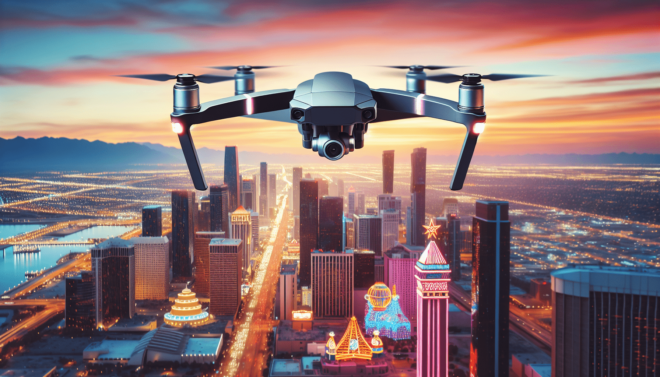Have you ever wondered if Las Vegas drone laws apply equally to recreational flyers and commercial operators? Whether you are capturing stunning skyline shots for fun or using your drone for business purposes, it’s crucial to understand the rules and regulations that govern drone usage in Las Vegas.
Understanding Las Vegas Drone Regulations
Flying a drone can be a thrilling experience, but as with any activity, there are guidelines that you need to follow to ensure everyone’s safety and compliance with the law. In Las Vegas, both recreational and commercial drone operators must adhere to specific regulations. These rules are established by federal, state, and local authorities to ensure the safe and responsible use of drones.
Federal Regulations
First and foremost, let’s look at the federal regulations established by the Federal Aviation Administration (FAA). These rules apply to all drone operators in the United States, including those in Las Vegas.
Recreational Flyers:
- Must register drones weighing over 0.55 pounds.
- Always keep the drone within visual line-of-sight.
- Fly at or below 400 feet in controlled airspace (Class G).
- Never fly near other aircraft, especially around airports.
- Do not fly over groups of people, public events, or stadiums full of people.
- Avoid flying near emergency response efforts, such as fires or hurricanes.
- Must take the Recreational UAS Safety Test (TRUST).
Commercial Operators:
- Must obtain a Remote Pilot Certificate under FAA Part 107.
- Drones must be registered regardless of weight.
- Ensure the drone remains within visual line-of-sight.
- Flight altitude limit is 400 feet above ground level.
- Operations in Controlled Airspace (Class A, B, C, D) require FAA approval.
- Must yield right of way to other aircraft.
- Conduct preflight checks to ensure the drone’s safety and airworthiness.
For an at-a-glance comparison, see the table below:
| Regulation | Recreational Flyers | Commercial Operators |
|---|---|---|
| Registration | Required if over 0.55 pounds | Required regardless of weight |
| Certificate | TRUST test | Remote Pilot Certificate (Part 107) |
| Visual Line-of-Sight | Required | Required |
| Altitude Limit | 400 feet | 400 feet |
| Controlled Airspace | Not without FAA approval | Requires FAA approval |
| Operation Near People | Not allowed | Restricted under Part 107 |
| Emergency Response Areas | Not allowed | Not allowed |
| Preflight Safety Check | Recommended | Mandatory |
Nevada State Regulations
In addition to federal regulations, Nevada has its own set of rules that drone operators must follow. These statewide regulations focus on privacy, security, and safety.
Statewide Rules:
- It is illegal to fly a drone to stalk someone or invade their privacy.
- Operating drones while under the influence of drugs or alcohol is prohibited.
- Drones must not interfere with manned aircraft operations.
- Flights over government facilities such as prisons or water treatment plants are not allowed.
Any violations of these state laws can lead to significant penalties, including fines and imprisonment.
Las Vegas Local Regulations
The city of Las Vegas has also implemented specific rules to address the unique environment of the area. These regulations accommodate the bustling tourist attractions, dense population areas, and high-frequency events.
-
Drones and the Strip: Flying drones along the Las Vegas Strip is heavily restricted. The proximity to McCarran International Airport and the dense concentration of people make drone operations risky and complicated. Operators must receive explicit permission from local authorities to fly in this area.
-
Residential Areas: Drone flights over residential properties may be considered an invasion of privacy. Always seek permission from homeowners if your flight path includes residential zones.
-
Public Events: Flying drones during public events such as concerts, sports events, or conventions is generally not allowed unless you have acquired the necessary permits and permissions from event organizers and local authorities.
-
Las Vegas Parks: Certain parks in Las Vegas allow drone flights under specific conditions. However, always check park rules and regulations before planning your flight.
Legal Implications of Non-Compliance
Failure to comply with federal, state, and local drone laws can have serious legal consequences. These can range from fines and confiscation of your drone to more severe penalties such as criminal charges and imprisonment.
Recreational Flyers
If you are a recreational flyer, you might think the rules are less stringent. However, non-compliance can still lead to substantial fines ranging from a few hundred to several thousand dollars. Additionally, irresponsible flying can lead to accidents, endangering yourself and others, which could result in legal actions against you.
Commercial Operators
Commercial operators face even stricter penalties such as the loss of the Remote Pilot Certificate, hefty fines, and potential lawsuits for damages if an accident occurs. Given that commercial drone usage often involves clients and contracts, non-compliance can also result in breach of contract and business reputation damage.
Essential Tips for Safe Drone Flying in Las Vegas
Regardless of whether you are flying your drone for fun or business, following best practices can ensure a safe and enjoyable experience. Here’s how you can be a responsible drone operator:
-
Check Airspace Restrictions: Always check for airspace restrictions and no-fly zones before your flight. Apps like B4UFLY can give you real-time airspace status information.
-
Weather Conditions: Avoid flying your drone in adverse weather conditions such as high winds, rain, or thunderstorms. Adverse weather can make it difficult to control your drone and increase the likelihood of crashes.
-
Pre-Flight Checklist: Conduct a thorough pre-flight check. Ensure your drone is in good working condition, the battery is fully charged, and the firmware is up to date.
-
Maintain Visual Line of Sight: Always keep your drone within your line of sight to reduce the risk of collisions and loss of control. This is especially important in areas with heavy air traffic.
-
Respect Privacy: Be mindful of people’s privacy. Avoid flying your drone over private properties or capturing images and videos without permission.
-
Stay Informed: Stay updated with any changes in drone regulations. Laws and guidelines can change, and being informed ensures you remain compliant.
Understanding the Differences in Regulation Enforcement
The enforcement of drone laws can vary between recreational flyers and commercial operators based on the nature of their operations and the inherent risks involved.
Enforcement for Recreational Flyers
For recreational flyers, enforcement is generally more educational. Authorities may offer warnings and educational resources to promote safe flying habits. However, repeated violations or severe breaches, such as flying in restricted airspace or endangering public safety, can result in more severe penalties.
Enforcement for Commercial Operators
Commercial operators are subject to stricter scrutiny due to the professional nature of their operations. Enforcement actions can include routine inspections, audits, and investigations by the FAA. Non-compliance can lead to the suspension or revocation of the Remote Pilot Certificate, financial penalties, and potential civil litigation.
How to Obtain Necessary Approvals and Permits
Securing the right approvals and permits can be a complex process, but it’s essential for operating your drone legally in Las Vegas.
Recreational Flyers
-
Register Your Drone: Make sure your drone is registered with the FAA if it weighs over 0.55 pounds. The registration is valid for three years and costs $5.
-
Check Airspace Maps: Use airspace maps to ensure you are flying in permitted areas. Tools like the FAA’s B4UFLY app can help.
-
Contact Local Authorities: If you plan to fly in restricted areas, contact local authorities for any additional permissions that may be required.
Commercial Operators
-
Obtain a Remote Pilot Certificate: To operate commercially, you need to pass the Part 107 exam and obtain a Remote Pilot Certificate. This certificate needs to be renewed every two years.
-
File for Waivers: If your operation requires flying in controlled airspace or beyond the standard regulations (e.g., nighttime operations), you need to file for waivers through the FAA’s DroneZone portal.
-
Coordinate with Local Authorities: Depending on your flight area, you might need additional permissions from local authorities. For instance, flying around the Las Vegas Strip may require coordination with both the FAA and local law enforcement.
Case Studies and Real-World Examples
Recreational Flyer Incident
Consider the example of a recreational flyer who flew a drone over a music festival in Las Vegas without permission. The drone collided with a stage rigging, causing a minor injury to a performer and damaging equipment. The flyer faced not only a hefty fine but also civil lawsuits from the event organizer and the injured performer. This incident underscores the importance of adhering to the regulations and seeking necessary permits.
Commercial Operator Success Story
A commercial operator wanted to capture promotional footage of a new hotel in Las Vegas. The operator navigated the complex web of regulations by obtaining a Remote Pilot Certificate, securing waivers for flying in controlled airspace, and coordinating with local authorities. The project was successful, highlighting that compliance not only avoids penalties but also facilitates smooth and professional operations.
Conclusion: Navigating Las Vegas Drone Laws Efficiently
Navigating the complexities of Las Vegas drone laws may seem daunting, but with the right knowledge and preparation, it is entirely manageable. Both recreational flyers and commercial operators must adhere to a common set of rules established by the FAA, state, and local authorities, although the regulations for commercial use are typically more stringent.
Whether you’re in it for the fun or the business potential, knowing and respecting the laws will help you enjoy your drone flights safely and legally. So next time you take to the skies over Las Vegas, you’ll do so with confidence that you’re in full compliance with the law. Happy flying!

